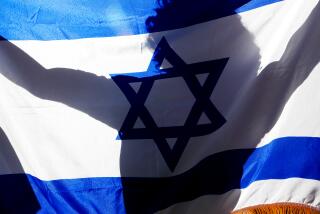Freedom’s Blessings Allow Host of Religions to Enrich the Nation
During the Thanksgiving holiday period, as we reflect on our abundance of blessings, it’s worth recalling that the First Amendment’s guarantee of religious freedom may be the best gift of all. Though there have been dark moments of intolerance against Jews, Catholics, Baptists, Quakers, Mormons and other groups in our history, none have been state-sanctioned. (A tragic exception might be the way in which the government suppressed Native American religion and culture.)
As a result, America is religiously diverse and that has enriched our culture and had a cross-pollinating effect of one religion upon another. The Religious Diversity Faire held each October for the last five years at UC Irvine, the first such event in the nation, is a testimony to the multifaith situation locally and to interreligious enrichment.
Here are a few examples of how religious diversity has enriched America and been mutually beneficial to our many faiths.
-- Protestants founded dozens of colleges and universities. Harvard, Yale and Princeton, for example, began as colleges for the training of clergy. In the 19th century--through the efforts of Methodist “circuit riders” and other traveling preachers--most frontier homes had at least one book to read, the Bible. Its impact on literacy, as the life of Abraham Lincoln makes clear, was monumental.
-- The founding of parochial schools by Roman Catholics gave immigrant children access to education that might not have been possible otherwise. Parochial schools, in turn, were a stimulus to the improvement of public schools. Catholics went on to found more than 200 colleges and universities whose impact on the intellectual life of Catholics and the nation as a whole has been immense. These Catholic immigrants encountered a world of Protestantism is which they were the minority. Consequently, they came to value religious freedom and its conjoint democratic values. So it is not surprising that the architect of the Second Vatican Council’s Declaration on Religious Freedom was an American Jesuit, John Courtney Murray.
-- African Americans, in the midst of slavery and then segregation, created a unique kind of Christian religiosity whose musical expressions gave birth to gospel music and influenced jazz and blues.
-- American Jews, influenced by the biblical and Talmudic injunctions to seek justice and work for the restoration of the world, helped found labor unions and were active in the civil rights movement. America afforded Jews opportunities not possible in Europe, where anti-Semitism was endemic, and Jews responded by contributing significantly to the America’s intellectual, scientific and cultural life.
-- The emphasis in both Hinduism and Buddhism on inwardness and meditation has influenced the spirituality of many Jews and Christians and helped them rediscover their mystical traditions.
-- Muslims--who have come to the United States in large numbers only since the mid-60s when immigration laws were liberalized--have exemplified, for other Americans, piety and dedication to work and family. American Muslims have come to cherish the disestablishment of religion and the freedom it brings.
A case in point of how American Muslims have learned to operate effectively in the American setting is their response to a current film, “The Siege.” (The film deals with a state of martial law imposed upon Brooklyn after several bombings by Arab extremists seeking the release of a jailed sheik.) When the film was in production, the Council on American-Islamic Relations raised objections to its portrayal of Arab Muslims as terrorists. In particular, they requested that an insert appear at the beginning of the film stating that the goal of “The Siege” was, in fact, to challenge intolerance and infringement of constitutional rights. Although the film’s producer, 20th Century Fox, turned down the request, some changes were made in the interest of fairness and balance.
When the film opened at the beginning of the month, students from the Muslim Students Assn. at Cal State Fullerton picketed peacefully and distributed informational material at several Orange County theaters. According to Omar Musallet, the group’s president, the intention was not to keep anyone from seeing the film, but to inform film-goers that it contained false stereotypes about Islam, including the idea that the Koran condones terrorism. Musallet said he and other picketers were not hassled.
So the Muslim community--nationally and locally--handled the controversy over “The Siege” by exercising another First Amendment right, free speech, and demonstrated in the process that Islam is at its core a nonviolent religion.
All of this is not to deny that religious freedom, like press freedom, can be abused--as the Jonestown suicide-slaughter and the Heaven’s Gate tragedies illustrate. But the amazing blessings of a free marketplace of religious expression have far outweighed the problems.


